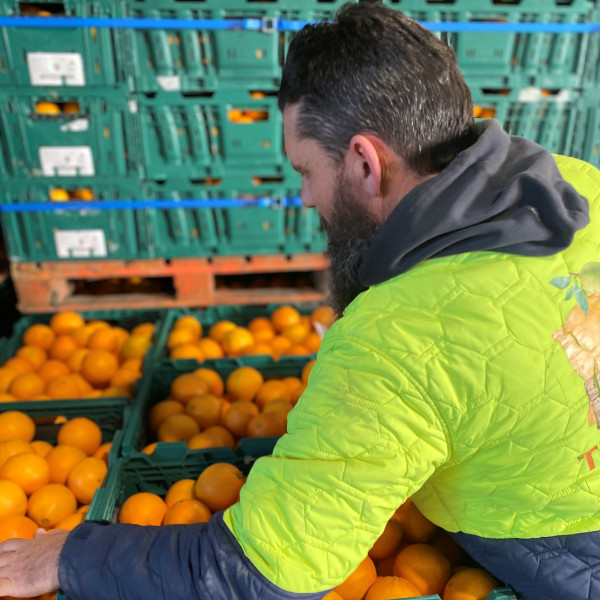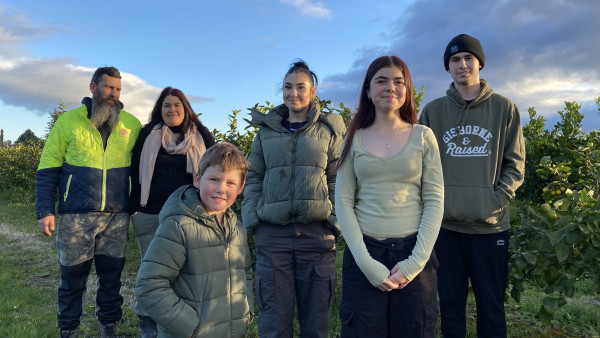"I've ever seen it like this"
14 August 2023
After a lifetime in the business, Warwick Paulson and his grower clients are working through the most challenging citrus season he's ever seen.
It's like a ‘tale of two cities’ at Warwick Paulson's orchard, just 12 kilometres from the centre of Gisborne.
Apart from repeated washes of surface water, all looks relatively normal at the 20-hectare farm established by his grandparents 80 years ago.
Over the stopbank by the Waipaoa River, though, the 50 part-leased hectares he uses mainly for stock still shows signs of the metres of water that rushed through during Cyclone Gabrielle. Troughs that weren't blasted over remain full of silt. And any fences not smashed wear garlands of muddy debris.
“At the moment that land is pretty-much a write-off,” Warwick says. “It's so wet we just can't get in to do any repair work.
“So we've definitely lost a year's income plus any reinstatement costs, but we hope that by spring it will be dry enough to get down there and get stuck in.”
Until then he has plenty to keep him busy on the parts of the property that house one home for his family and another for his parents; his orchard; and the packhouse that has been in full swing handling the season's citrus crops.
At his home orchard – Terrace End Farms – Warwick grows a mixed bag of lemonades, Satsuma and Encore mandarins, limes, Meyer lemons, and Navel and Valencia oranges, with more mandarins and oranges at a recently-purchased 5ha holding a few kilometres down the road.

Warwick Paulson was processing his own Navel oranges by early July but says there was less Tag 1 fruit than he would have liked to have seen
He also works with up to 40 other growers – from hobby farmers to commercial operators – packing and marketing their fruit under the trading name JRP Citrus.
But after two cyclones, relentless wet weather and three States Of Emergency this year alone, Warwick admits it's been hard going for most, if not all, of them.
“I've always considered myself lucky to have this great, dry orchard but not this year, I've never seen it like this. You look down the rows and from one end to the other is just water and as soon as it gets the chance to drain away, along comes the rain.”
Warwick is optimistic the region's hardy citrus plantings will survive and that next season will be better, but for now he and his partner growers are just doing the best with what they have.
But it's been tricky, he says.
“Our last major weather events (June and July) came in the middle of the Satsuma and lemon harvests, and right on the cusp for Navels, so we've had to work hard to keep clear rot and brown rot out of the packhouse.
“That has meant more losses and more money spent on things like selective picking, but it's important we only pack clean fruit to keep up consumer confidence.”

It's all about family ... Warwick and Kirsty Paulson (left) named their JRP Citrus business after their children (from left) Casey (6), Rylee (15), Pieta (12) and Jamie (18)
Challenges presented by Valentine's Day's Cyclone Gabrielle certainly haven't helped, adds Warwick.
“Some of our growers are on town supply so they couldn't get their protectant sprays on,” he says. “And even for those who could, the rain would just wash them off before they had time to do their work so we've seen stressed trees just aborting their loads.
“It's not just been one big event. It's been a series of events that have taken their toll on the season and it's my gut feeling is that will continue with other products throughout the year.”
Despite those challenges, Warwick is optimistic most trees will survive and the current issues will drop away as growers go into a – hopefully – drier spring.
“The way I look at it is that we're in damage control. Right now things aren't looking great, so it's about thinking outside the square and finding the solution for that moment in time.”
Warwick Paulson says his decision to establish his own packhouse and marketing arm – along with a supporting trucking company – is an extension of the ‘out of the box’ thinking he saw in his father, and his grandfather before him.
After his grandparents Alfred and Violet bought the original property in 1943 they focused on growing maize, a crop increasing in demand at the time.
“Then after my parents (Peter and Yvonne) married in 1966 they effectively took over farming the land and as we got older we all worked with them, after school and every holiday.”
Peter also leased extra land to accommodate his many ventures from growing maize, grapes and tamarillos to rearing racehorses, sheep and bobby calves.
“Everything he did came to fruition in stages, so the work – and the income – was spread throughout the year,” says Warwick.
“That was what he was thinking in 2000 when I moved back home to work with him. We ripped out the grapes and started planting citrus to establish a really diverse group of products that came on stream at different times.”
Even then the Paulsons were packing and selling their fruit themselves. Warwick and wife Kirsty also grew their own family with four children – Jamie (18), Rylee (15), Pieta (12) and Casey (6) – the initials of whose names make up title of JRPC, the company founded in 2010.
Then in 2015 the couple formally purchased the orchard, three years later building the 1000-square-metre Terrace End Farms Packhouse and buying the trucks used both there and in grower orchards.
“We aren't a huge operation but while having the trucks is not a money-spinner, it means we aren't relying on other operators to manage a steady stream of fruit,” Warwick says.
“Between the citrus plus some feijoas and persimmons the work is spread to keep the packhouse running all year round. So it's like how my father worked out his plantings all those years ago… Diversity is good for managing both income and labour and because you never really know what your star performer will be, not relying on one product brings real peace of mind.”
Warwick says it works because he has surrounded himself with a great team of people, including brother Stewart (who has his own on-orchard consulting company) and the off-shore contacts he has for exporting the lemons.
“Essentially I'm a pretty quiet person, something I need to put aside as I deal with so many people,” he says.
“But at the end of the day I'm a grower, too, and my happy places are growing, picking, packing and selling fruit.
“So I know first-hand what is involved in producing a crop, and how growers need to get the best returns possible for their efforts.”
First published in the August issue of The Orchardist magazine. To read the magazine click here.
